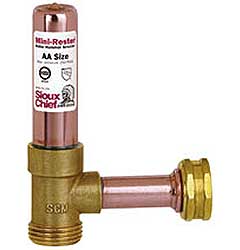 
Over 698,000 strictly plumbing related posts
Plumbing education, information, advice, help and suggestions are provided by some of the most experienced plumbers who wish to "give back" to society. Since 1996 we have been the best online (strictly) PLUMBING advice site. If you have questions about plumbing, toilets, sinks, faucets, drains, sewers, water filters, venting, water heating, showers, pumps, and other strictly PLUMBING related issues then you've come to the right place. Please refrain from asking or discussing legal questions, or pricing, or where to purchase products, or any business issues, or for contractor referrals, or any other questions or issues not specifically related to plumbing. Keep all posts positive and absolutely no advertising. Our site is completely free, without ads or pop-ups and we don't tract you. We absolutely do not sell your personal information. We are made possible by: 
|
|
Author:
nicholas123 (FL)
I am replacing all the copper plumbing in my house with cpvc because copper only last about 10 years in my neighborhood. The walls thin to nothing and eventually pin holes appear. Reason is unknown and I will post about this someday. Local plumbers have recommended the switch too.
To my knowledge, my 30-year old house has never had a problem with water hammer. The only water hammer arrestors I have are old-fashioned stand pipes (air chambers) at the master bathroom sink and the kitchen sink. That's it. Even the clothes washing machine doesn't have an arrestor. When the washing machine fill valve opens and closes, the water hoses jump a little.
I have never seen any damage from water hammer...cracked lines...pipes rubbing thin against concrete walls, etc. I guess I have no problems because the plumber secured the pipes down well and my water pressure is only 40 psi.
I have heard from many plumbers that stand pipes (air chambers) don't work...they fill with water eventually. So, basically I have been living without arrestors for 30 years and have had no problems.
I don't like the idea of stagnant water in arrestors. And, in my case, with no outward signs of water hammer, how can I tell if they are working or have failed. All things, especially things with moving parts, fail eventually.
My biggest fear is that without arrestors, the new cpvc plumbing, being less durable than copper, will move and rub against something and eventually fail.
What do you think? Should I leave out the arrestors? Add them later if I can see or hear problems? Or, can water hammer exist without seeing or hearing it, and secretly cause damage. Again, in 30 years, with only two sets of ineffective old-fashion air chambers, I haven't seen any problems. Thanks a bunch!
By the way, Florida code says "A water-hammer arrestor shall be installed where quick-closing valves are utilized."
|
|
Post Reply
|
|
|
Author:
bernabeu (SC)
simple - don't use quick closing valves
exception: install mechanical one piece arresters at the washing machine hook-up

[www.plumbingsupply.com]
==============================================
"Measure Twice & Cut Once" - Retired U.A. Local 1 & 638
Edited 1 times.
|
|
Post Reply
|
|
|
Author:
hj (AZ)
quote; And, in my case, with no outward signs of water hammer, how can I tell if they are working or have failed.
By DEFINITION, they have failed. In fact it probably happened within a few months after you moved in. PEX, and other plastic water lines, can "expand" and absorb the 'water hammer' before it occurs.
|
|
Post Reply
|
|
|
Author:
nicholas123 (FL)
I have read many times that air chambers don't work because they become water logged eventually. I wanted to see for myself and see how long they really last.
I tee'd in an 18-inch long clear tube next to my washing machine, which is used about every other day. I measured the air bubble every day for almost a month. The air bubble shrank about 1/16 inch every day. As someone said on this forum, the water just absorbs the air over time.
Another thing that surprised me was that the air bubble compressed a lot when it was first installed. If you remember back in chemistry, the formula pV=nRT, you can calculate that the air bubble will shrink to about 1/4 its original size because the air goes from zero gage pressure (14.7 absolute pressure) to 39 psig (my water pressure). So in my case the initial bubble went from 18 inches to 5 inches.
So if I was to install an 18-inch air chamber, which starts off with only a 5-inch air bubble, and I loose 1/16 inch each day, my air chamber would become water logged in about 80 days.
Yeah, I could shut off the water and drain the air chamber, but if I wanted the air chamber to last something reasonable like say one year, my air chamber would have to be 7 foot long! Well, I do have 8 foot ceilings. Hmmm. Just kidding, please nobody do this.
|
|
Post Reply
|
Please note:
- Inappropriate messages or blatant advertising will be deleted. We cannot be held responsible for bad or inadequate advice.
- Plbg.com has no control over external content that may be linked to from messages posted here. Please follow external links with caution.
- Plbg.com is strictly for the exchange of plumbing related advice and NOT to ask about pricing/costs, nor where to find a product (try Google), nor how to operate or promote a business, nor for ethics (law) and the like questions.
- Plbg.com is also not a place to ask radiant heating (try HeatingHelp.com), electrical or even general construction type questions. We are exclusively for plumbing questions.
Search for plumbing parts on our sponsor's site:
Special thanks to our sponsor:

|




